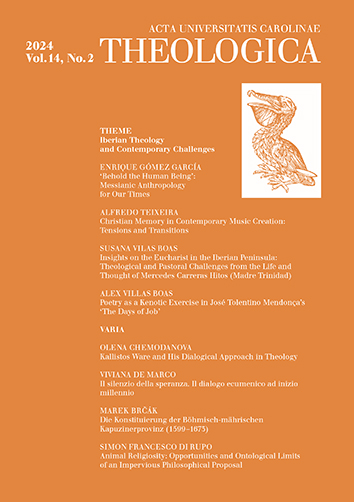AUC Theologica is a peer-reviewed journal for theology published twice a year. As we publish original papers in English, German, French, and Italian, our mission is to serve as a platform both for Czech researchers, who can present their research results in these languages, and for international contributors, who are invited to enter the academic theological discussion in the heart of Europe.
The journal focuses on a wide range of theological disciplines, such as systematic theology, biblical studies, patristic studies, pastoral and spiritual theology, religious education, church history, etc. Within these fields, the journal seeks to reflect the current theological questions and problems, which often requires interdisciplinary approaches. Supporting the intersection of various theological disciplines, we thus also welcome theological papers touching other academic fields including philosophy, sociology, literary studies, and science.
Each issue consists of two sections. The thematic section presents papers of the same focus. The section called ‘Varia’ invites papers dealing with various theological themes from the perspective of all Christian traditions. Our current and past issues are approachable for free on this website in the form of Open Access.
AUC THEOLOGICA, Vol 14 No 1 (2024), 83–95
«Quale Europa cristiana e quale Lutero?» A proposito di un recente volume di F. Buzzi
[‘Which Christian Europe and Which Luther?’: About a Recent Volume by F. Buzzi]
Ľubomír J. Žák, Nico de Mico
DOI: https://doi.org/10.14712/23363398.2024.7
published online: 01. 11. 2024
abstract
The article aims to draw attention to the book Quale Europa cristiana? La continuità di una presenza (Which Christian Europe? The Continuity of a Presence) by Franco Buzzi, a Milanese theologian and renowned scholar of the Lutheran Reformation. It particularly focuses on Buzzi’s intention to explore the relationship between Western Europe and Christianity, not only regarding the developments stemming from the birth and spread of Luther’s Reformation but also concerning the critique of Luther’s thought and reformist work, which continues to characterise certain strands of Catholic historiography and theology. At the core of this critique lies a twofold conviction: that Luther is the instigator of the division of Christianity and Europe, and that he is the primary cause of the decline of European Christendom. The article explains why Buzzi considers these convictions to be entirely unfounded and unjust. Moreover, it demonstrates that his interpretative stance offers important insights, enabling further progress in exploring the theme of ‘Europe and Christianity’ and examining the interconnection between the unity of Europe and the unity of Christianity.
keywords: Europe and Christianity; Martin Luther and Europe; Consequences of the Reformation; Ecumenism

«Quale Europa cristiana e quale Lutero?» A proposito di un recente volume di F. Buzzi is licensed under a Creative Commons Attribution 4.0 International License.
148 x 210 mm
periodicity: 2 x per year
print price: 100 czk
ISSN: 1804-5588
E-ISSN: 2336-3398
